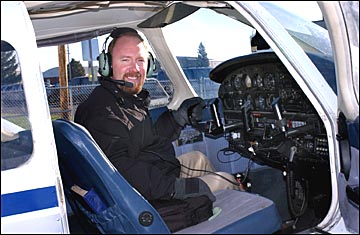|
|
|
|
|
November 8, 2002Therapist 'learns by doing' on ground and in air
Whether it's rediscovering his love of small plane flight or working with master's and doctoral students in clinical training, Ronald Werner-Wilson said it's all about making the experience real. Werner-Wilson is an assistant professor of human development and family studies and director of the Marriage and Family Therapy Program and Clinic in the College of Family and Consumer Sciences. Soloing "In flying, like clinical training, you learn by doing," said Werner-Wilson. "When flying, your hands are on the power and the yoke. In clinical training, you are immediately helping folks with crisis or other serious issues. It makes learning less casual. In either case, you are soloing soon after you begin training." Arriving at Iowa State in 1998 from Colorado State University, Fort Collins, Werner-Wilson has been the director of the clinic for three years and director of the doctoral program for one year. He created the master's program in marriage and family therapy. "Having both a master's and doctoral program in this area is unique," said Werner-Wilson. "There are five universities that offer both programs and 15 doctoral programs in the country." The clinic works on about 100 cases a year, with the average case requiring 15 one-hour sessions. That brings the clinic's annual client contact hours to a minimum of 1,500 hours. About 40 percent of the caseload comes from ISU students, and the remaining clients are primarily low-income families, Werner-Wilson said. The Government of the Student Body subsidizes student fees (students pay $5 per session). Fees for non-student families are based on their ability to pay. "Student Counseling Services has a maximum number of sessions per student; we don't," Werner-Wilson said. "We continue working with a student as long as there is a need. Student Counseling also sends almost all couple cases here." Session tapes help Werner-Wilson said he uses a "process" research model in the sessions. "We look at what is happening in the therapy process and isolate what is helpful and not," he said. "We videotape (for research and training only) and code by different variables based on what is helping the client." For example, session tapes have allowed students to test if women are interrupted more than men during counseling sessions, as suggested by clinical data, Werner-Wilson said. To systematically interrupt only one person during therapy is a problem, he said. Werner-Wilson's research challenges a common belief -- that women talk more than men. "The tapes showed women weren't talking more," he said, "whether they were with student or master therapists. It appears misperceptions are widespread and something that we need to pay attention to." A major part of Werner-Wilson's research involves adolescent behavior, particularly how factors such as peers, parental relationships and family stresses influence adolescent sexual behavior. Fragmented research A National Public Radio story interested Werner-Wilson in adolescent sexuality. "The story said heterosexual young people were now the highest-risk age group for HIV/AIDS," he said. "This told me that sexuality education programs were failing." One reason is research on teen sexuality is fragmented. "There was research on the influences of self-esteem, locus of control, single versus dual parent families and siblings, but very little research that was looking to identify the common factors," he said. "I started to look at all of the variables on teen sexuality and then to put it all into context. The big constant is that families remain important. "We have a culture that says families don't matter but research, including mine, shows adolescents believe parents do have a significant influence on their lives," said Werner-Wilson. "Whether the issue is smoking, drinking or sexuality, parents are important and teens do listen to them." Werner-Wilson also studies positive youth development and participation in structured out-of-school programs. Such activities include church youth groups, boys and girls club activities, and band. These activities create leadership skills, respect for diversity and positive self-esteem, he said. Freedom in flight Werner-Wilson wrote a book on a model of family therapy with adolescents, Developmental-Systemic Family Therapy with Adolescents. The book brings together constructs from family therapy, family sociology, developmental psychology and social psychology. The goal of the book, he said, was "to bring together what happened haphazardly in my own training. It looks at issues such as identity, self-esteem and emotional development. All of these areas are nice, inter-locking systems that provide a sophisticated understanding of interventions for adolescents that are developmentally appropriate." Family is a strong theme in Werner-Wilson's own life. He enjoys all types of family activities, especially bike riding and baking treats for his family -- wife Tracey; son William, 6; and daughter, Francis, 3 1/2. The son of an Air Force officer and a former member of a youth organization, Civil Air Patrol, Werner-Wilson has long been interested in flying. "I am a licensed pilot but I haven't flown regularly until recently," he said. "I'm working with a local flight instructor to update my license. There's a certain romance about being in the air -- a certain freedom that is tangible for me." |
|
Ames, Iowa 50011, (515) 294-4111 Published by: University Relations, online@iastate.edu Copyright © 1995-2001, Iowa State University. All rights reserved. |
